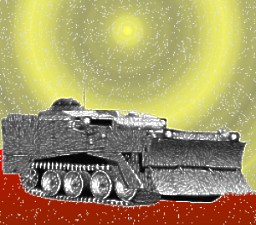
From Draft NOtices, November - December, 2003
Rebuilding? Iraqi Farms Bulldozed by U.S. Military — Lorraine Demi |

|
|||
|
How many times have we recently heard and read that the U.S. military focus in Iraq has shifted to rebuilding and ensuring "security" for the people recently freed from an oppressive dictator? How many of us sat with mouths agape when we learned that the unjust war in Iraq has damaged the country so badly that U.S. taxpayers are being charged billions of dollars to "rebuild" that which most of us didn't want destroyed in the first place? And now news has broken that the U.S. troops aren't rebuilding Iraq, but ruining the livelihoods, property, food sources, and independence for Iraqi farmers — and, indeed, being oppressive and dictatorial. At the end of September 2003, U.S. soldiers driving bulldozers uprooted ancient groves of date palms, orange and lemon trees in the small central Iraq town of Dhuluaya, 50 miles north of Baghdad. These groves provided income for 50 poor farming families of the Khazraji tribe, and were destroyed as collective punishment of farmers for not providing information about guerillas attacking U.S. troops in Dhuluaya and surrounding areas. U.S. troops told the farmers, over a loudspeaker in Arabic, that the fruit groves were being destroyed to punish the farmers for not informing on the resistance, which is very active in this Sunni Muslim district. Lt. Col. Springman, a U.S. commander in the region, justified the bulldozing: "We asked the farmers several times to stop the attacks, or to tell us who was responsible, but the farmers didn't tell us." U.S. military officers told a delegation that went to a nearby U.S. base asking for compensation for the lost farms that the bulldozing was a punishment of Iraqis because "you know who is in the resistance and do not tell us." This delegation brought a petition addressed to the coalition forces in Dhuluaya, signed by 32 of the farmers, pleading for compensation, and reading in part: "Tens of poor families depend completely on earning their life on these orchards and now they became very poor and have nothing and [are] waiting for hunger and death." One of the farmers who watched his livelihood ground into the dusty soil said: "They told us that the resistance fighters hide in our farms, but this is not true. They didn't capture anything. They didn't find any weapons." Witnesses saw the children of one woman farmer lie down in front of a bulldozer headed for their fruit trees, but the children were dragged away. A U.S. soldier grabbed and tried to smash the camera of an Iraq Today reporter who attempted to take a photograph of the bulldozers at work. Conversely, witnesses also saw one U.S. soldier break down and cry during the operation. Reporters asked one farmer how much his lost orchard was worth, and he answered in a distraught voice: "It is as if someone cut off my hands and you asked me how much my hands were worth." In addition to the obvious tone of terrorism this event exudes, it seems that no thought was given to the fact that the farmers may not know who is ambushing the occupying forces. Further, if they do know, it was also not taken into consideration that informing on guerillas is very dangerous in such a small village where everyone knows each other and the guerillas are not afraid to use violence. And most frightening is the fact that these soldiers actually found a way to justify these barbaric actions of ruining privately owned farms, income and food sources, and the way of life for very poor families. All this occurs, hypocritically, in the midst of the Western media frenzy about the U.S. rebuilding Iraq. Information source: Independent Digital (UK) Ltd.,
October 12, 2003. This article is from Draft NOtices, the newsletter of the Committee Opposed to Militarism and the Draft (www.comdsd.org) |
||||